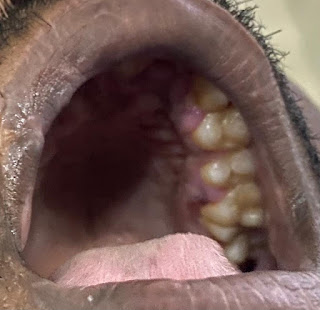BIMONTHLY ASSESSMENT (JANUARY)
26 year old woman with complaints of altered sensorium since 1 day,headache since 8 days,fever and vomitings since 4 days
Case presentation links:
a). What is the problem representation of this patient and what is the anatomical localization for her current problem based on the clinical findings?
- presented to casualty in a state of altered sensorium & irrelevant talk
- History of B/L hand small joint pains 6 yrs back Multiple joint pains 3 yrs back and diagnosed as SLE and using treatment which she stopped 10 days ago.
- C/o headache since 1 month which increased in last 10 - 15 days associated with vomitings since 1 week and fever, neck pain , generalized weakness since 4 days and altered sensorium with irrelevant talk since 1 day.
- Anatomical localization:
Headache,neckpain, fever: tubercular meningitis
Acute infarct in thalamus
Hyponatremia -kidney
b) What is the etiology of the current problem and how would you as a member of the treating team arrive at a diagnosis? Please chart out the sequence of events timeline between the manifestations of each of her problems and current outcomes.
Hyponatremia secondary to SIADH
Tubercular meningitis
SLE
Lesion in thalamic region.
SEQUENCE OF EVENTS
6yrs back pt had complaints of small joint pains in both hands qnd relieved by treatment given by local doctor
4yrs back pt was dx with SLE and started on tx
since last yr pt had c/o occadional headache, vomitings and fever
since 1 month pt presented in altered sensorium,fever
on 2nd day sensorium improves
on ceftriaxone for 3days
ATT started on day 4
c) What is the efficacy of each of the drugs listed in her prior treatment plan that she was following since last two years before she stopped it two weeks back?
Hydroxychloroquine
For example:
Why was she given bisphosphonates?
What is the efficacy of using primary bisphosphonate prophylaxis for patients started on corticosteroids?
- She was given bisphosphonates to prevent steroid induced osteoporosis
What is the efficacy of using primary PPI prophylaxis during initiation of any corticosteroids to prevent Gi ulcers?
d) Please share any reports around similar patients with SLE and TB meningitis?
Any reports of normal csf leukocyte count and normal csf protein in meningitis?
What could be the probable cause for a normal csf leukocyte count in a patient with chronic meningitis?
In partially treated meningitis cases
e) What is the sensitivity and specificity of ANA in the diagnosis of SLE?
2) Please go through the two thesis presentations below and answer the questions below by also discussing them with the presenters:
What was the research question in the above thesis presentation?
association of serum magnesium with type 2diabetes
What was the researcher's hypothesis?
The hypothesis is that magnesium levels are low in the people of DM-2,also,in the normal population,those with low values of magnesium are at an increased risk of developing diabetes,than those with normal levels.
Also the magnesium levels affect the outcomes and the rate of progression of the disease,that is the complications like nephropathy, neuropathy, retinopathy develop faster in those with low serum magnesium
What is the current available evidence for magnesium deficiency leading to poorer outcomes in patients with diabetes?
What is the current available evidence for magnesium deficiency leading to poorer outcomes in patients with diabetes?
What was the research question in the above thesis presentation?
24 hrs urinary sodium excretion values in newly diagnosed hypertensive patients.
What was the researcher's hypothesis?
24 hours urinary sodium in newly diagnosed hypertensive patients
The hypothesis is that, the amount of salt consumed is almost equal to the sodium excreted in the urine, which could lead to increase in the blood pressure
What is the current available evidence for the utility of monitoring salt excretion in the hypertensive population?
3) Please critically appraise the full text article linked below:
The main results of the trial showed that aspirin treatment did not significantly reduce the rate of stroke progression
What is the efficacy of aspirin in stroke in your assessment of the evidence provided in the article. Please go through the RCT CASP checklist here https://casp-uk.net/casp-tools-checklists/ and answer the questions mentioned in the checklist in relation to your article.
4) Please mention your individual learning experiences from this month.
1.Central line guided by Ajith sir and Dk sir
2.Ascitic tap guided by Ajith sir
3.Pleural tap guided by K.vaishnavi mam and Ajith sir
5.Treatment of alcohol dependency syndrome
6.2decho interpretation
5) a) What are the possible reasons for the 36 year old man's hypertension and CAD described in the link below since three years?
The 36 year old man with CAD, the etiological reasons to his CAD could be due to the long standing hypertension since 3 years along with being an alcoholic and smoker since 15 years adds up to the risk factors.
b) Please describe the ECG changes and correlate them with the patient's current diagnosis.
The initial ecgs shows irregular rhythm along with VPS
There are progressive ST segment changes in the anteroseptal leads - ? STEMI involving LAD territory/ LAD aneurysm
c) Share an RCT that provides evidence for the efficacy of primary PTCA in acute myocardial infarction over medical management. Describe the efficacy in a PICO format.


